Dietary Analysis for a Pro Footballer: Sports Nutrition Project
VerifiedAdded on 2023/06/15
|15
|2952
|374
AI Summary
This report provides a dietary analysis for a pro footballer aged 24 years, weighing 77 kg and height being 1.80 meters. It includes recommendations for increasing performance, accelerating recovery process, and reducing risks related to injury or illness. The report also includes scientific rationale for supervisors and fellow professionals working in the area.
Contribute Materials
Your contribution can guide someone’s learning journey. Share your
documents today.
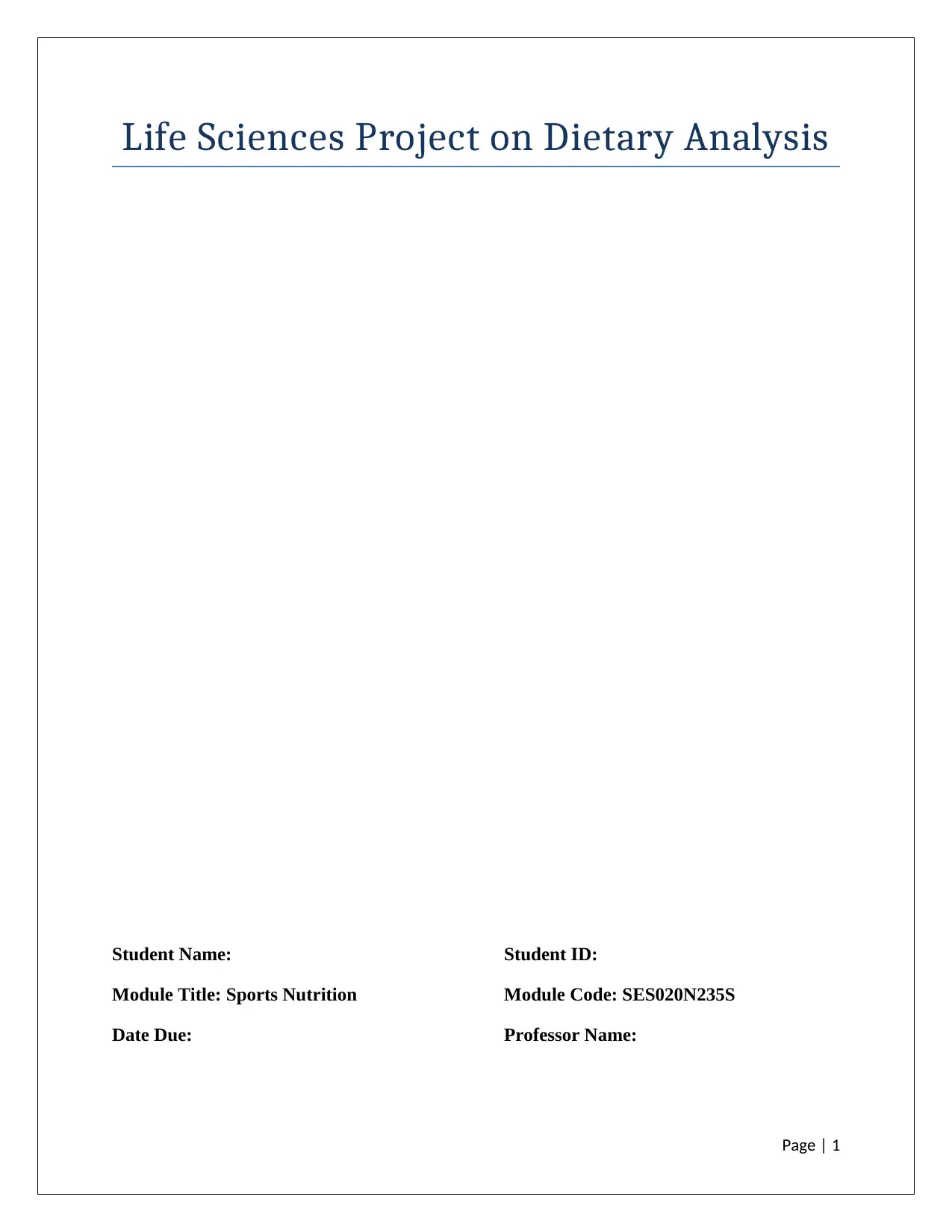
Life Sciences Project on Dietary Analysis
Student Name: Student ID:
Module Title: Sports Nutrition Module Code: SES020N235S
Date Due: Professor Name:
Page | 1
Student Name: Student ID:
Module Title: Sports Nutrition Module Code: SES020N235S
Date Due: Professor Name:
Page | 1
Secure Best Marks with AI Grader
Need help grading? Try our AI Grader for instant feedback on your assignments.
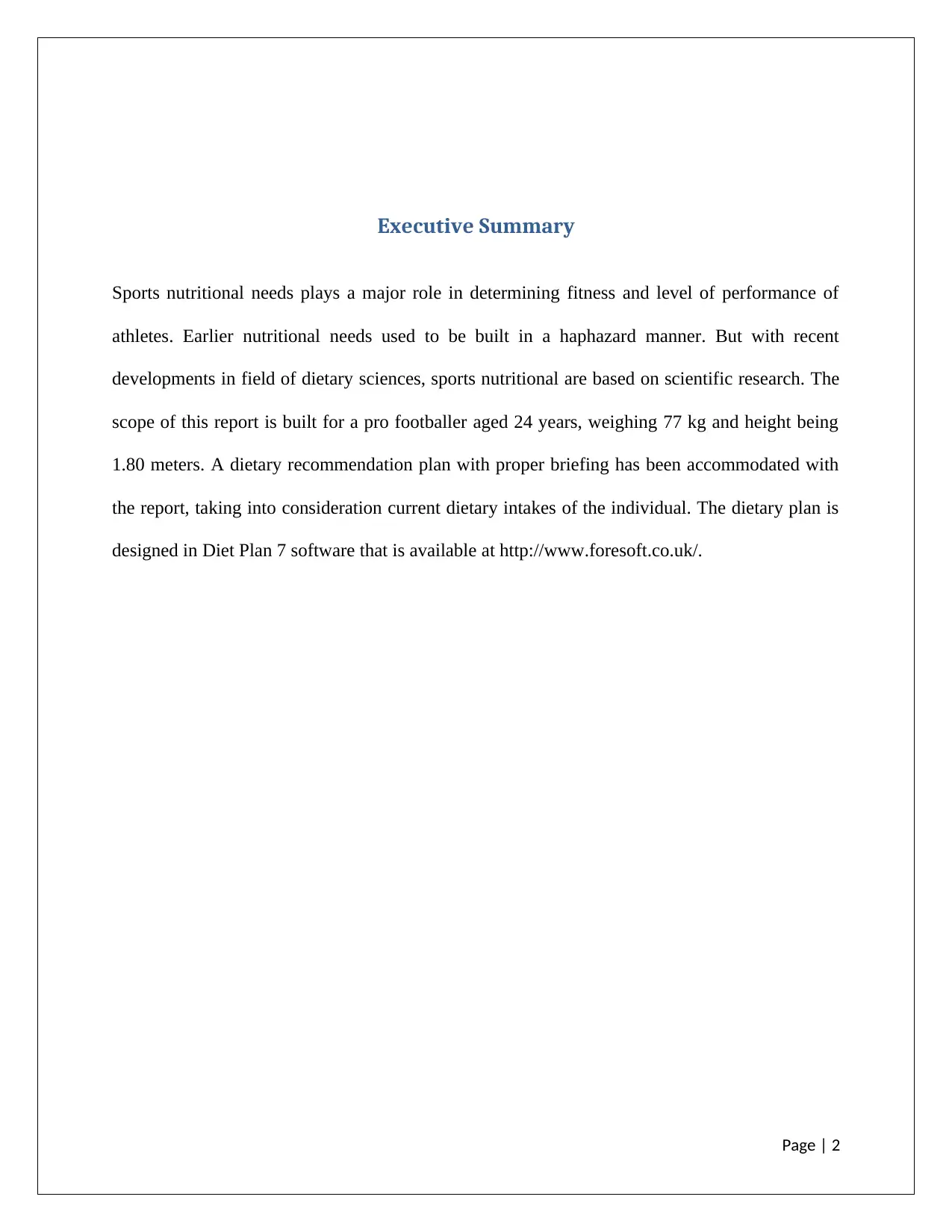
Executive Summary
Sports nutritional needs plays a major role in determining fitness and level of performance of
athletes. Earlier nutritional needs used to be built in a haphazard manner. But with recent
developments in field of dietary sciences, sports nutritional are based on scientific research. The
scope of this report is built for a pro footballer aged 24 years, weighing 77 kg and height being
1.80 meters. A dietary recommendation plan with proper briefing has been accommodated with
the report, taking into consideration current dietary intakes of the individual. The dietary plan is
designed in Diet Plan 7 software that is available at http://www.foresoft.co.uk/.
Page | 2
Sports nutritional needs plays a major role in determining fitness and level of performance of
athletes. Earlier nutritional needs used to be built in a haphazard manner. But with recent
developments in field of dietary sciences, sports nutritional are based on scientific research. The
scope of this report is built for a pro footballer aged 24 years, weighing 77 kg and height being
1.80 meters. A dietary recommendation plan with proper briefing has been accommodated with
the report, taking into consideration current dietary intakes of the individual. The dietary plan is
designed in Diet Plan 7 software that is available at http://www.foresoft.co.uk/.
Page | 2
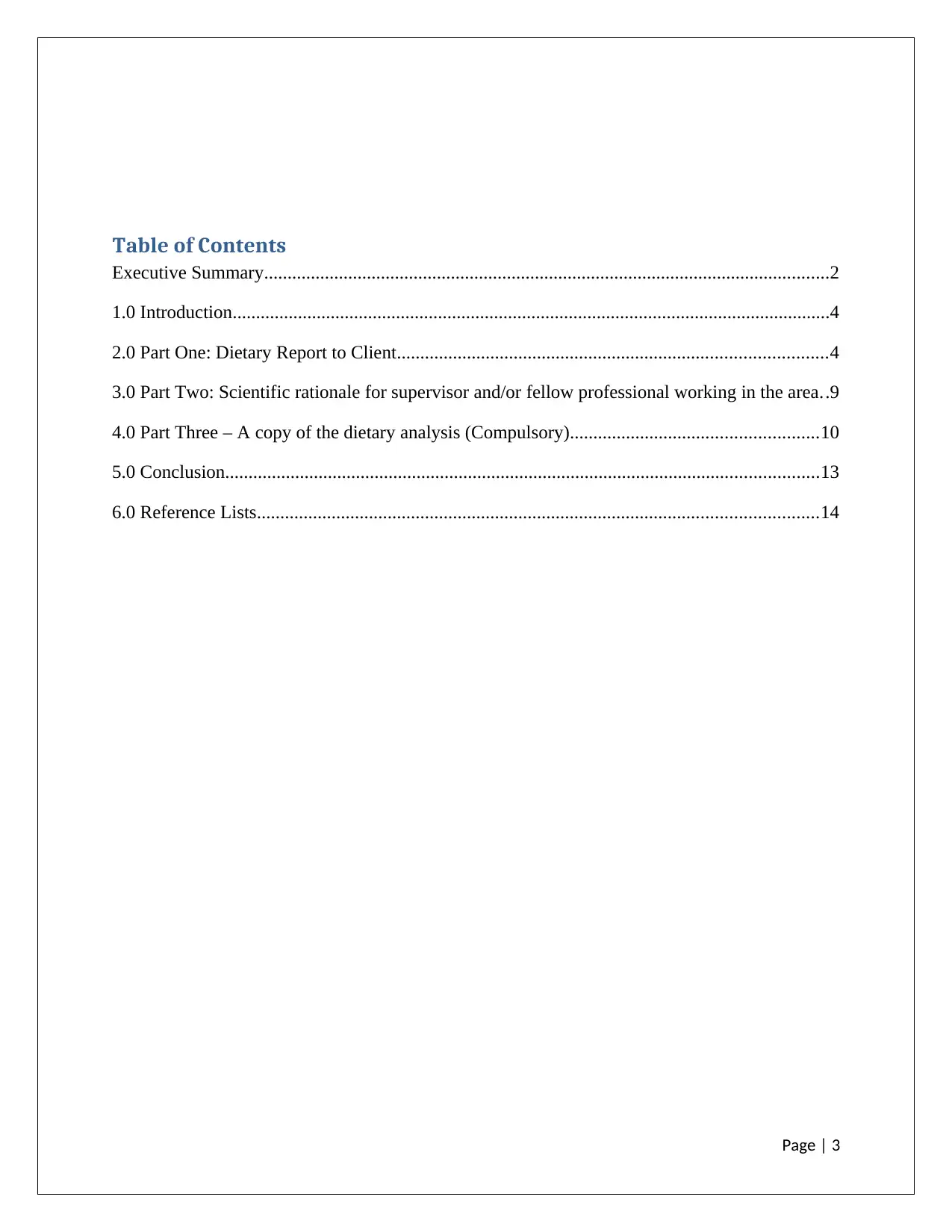
Table of Contents
Executive Summary.........................................................................................................................2
1.0 Introduction................................................................................................................................4
2.0 Part One: Dietary Report to Client............................................................................................4
3.0 Part Two: Scientific rationale for supervisor and/or fellow professional working in the area..9
4.0 Part Three – A copy of the dietary analysis (Compulsory).....................................................10
5.0 Conclusion...............................................................................................................................13
6.0 Reference Lists........................................................................................................................14
Page | 3
Executive Summary.........................................................................................................................2
1.0 Introduction................................................................................................................................4
2.0 Part One: Dietary Report to Client............................................................................................4
3.0 Part Two: Scientific rationale for supervisor and/or fellow professional working in the area..9
4.0 Part Three – A copy of the dietary analysis (Compulsory).....................................................10
5.0 Conclusion...............................................................................................................................13
6.0 Reference Lists........................................................................................................................14
Page | 3
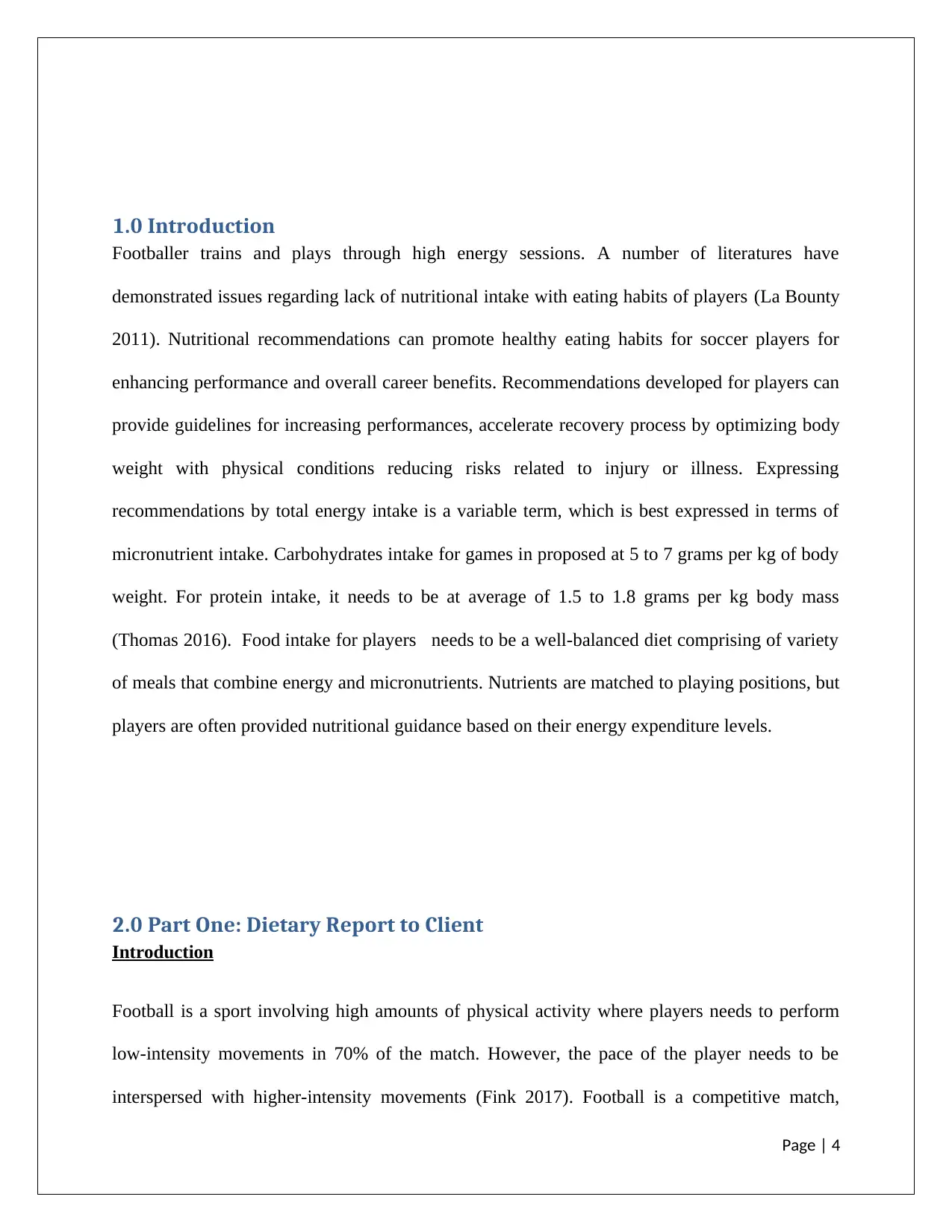
1.0 Introduction
Footballer trains and plays through high energy sessions. A number of literatures have
demonstrated issues regarding lack of nutritional intake with eating habits of players (La Bounty
2011). Nutritional recommendations can promote healthy eating habits for soccer players for
enhancing performance and overall career benefits. Recommendations developed for players can
provide guidelines for increasing performances, accelerate recovery process by optimizing body
weight with physical conditions reducing risks related to injury or illness. Expressing
recommendations by total energy intake is a variable term, which is best expressed in terms of
micronutrient intake. Carbohydrates intake for games in proposed at 5 to 7 grams per kg of body
weight. For protein intake, it needs to be at average of 1.5 to 1.8 grams per kg body mass
(Thomas 2016). Food intake for players needs to be a well-balanced diet comprising of variety
of meals that combine energy and micronutrients. Nutrients are matched to playing positions, but
players are often provided nutritional guidance based on their energy expenditure levels.
2.0 Part One: Dietary Report to Client
Introduction
Football is a sport involving high amounts of physical activity where players needs to perform
low-intensity movements in 70% of the match. However, the pace of the player needs to be
interspersed with higher-intensity movements (Fink 2017). Football is a competitive match,
Page | 4
Footballer trains and plays through high energy sessions. A number of literatures have
demonstrated issues regarding lack of nutritional intake with eating habits of players (La Bounty
2011). Nutritional recommendations can promote healthy eating habits for soccer players for
enhancing performance and overall career benefits. Recommendations developed for players can
provide guidelines for increasing performances, accelerate recovery process by optimizing body
weight with physical conditions reducing risks related to injury or illness. Expressing
recommendations by total energy intake is a variable term, which is best expressed in terms of
micronutrient intake. Carbohydrates intake for games in proposed at 5 to 7 grams per kg of body
weight. For protein intake, it needs to be at average of 1.5 to 1.8 grams per kg body mass
(Thomas 2016). Food intake for players needs to be a well-balanced diet comprising of variety
of meals that combine energy and micronutrients. Nutrients are matched to playing positions, but
players are often provided nutritional guidance based on their energy expenditure levels.
2.0 Part One: Dietary Report to Client
Introduction
Football is a sport involving high amounts of physical activity where players needs to perform
low-intensity movements in 70% of the match. However, the pace of the player needs to be
interspersed with higher-intensity movements (Fink 2017). Football is a competitive match,
Page | 4
Secure Best Marks with AI Grader
Need help grading? Try our AI Grader for instant feedback on your assignments.
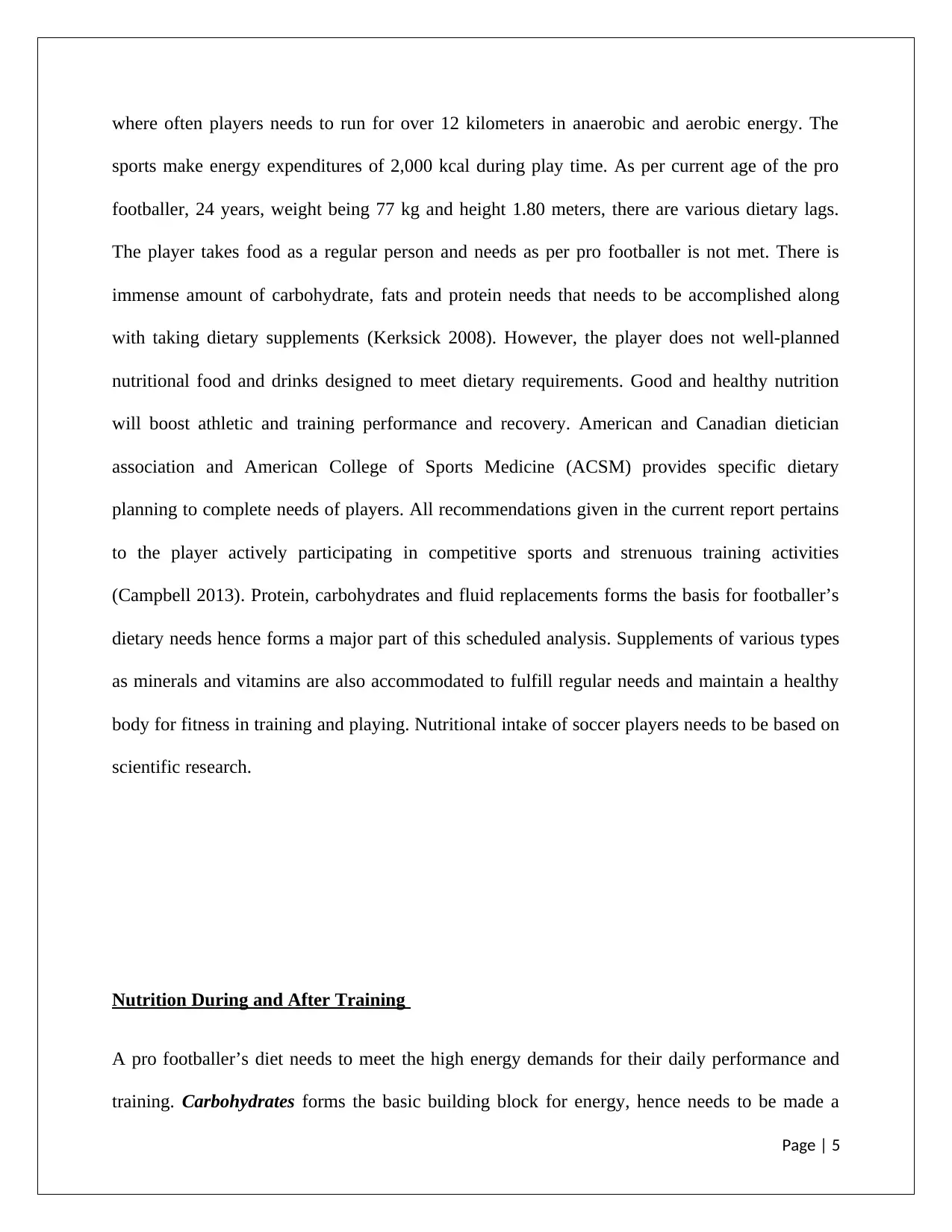
where often players needs to run for over 12 kilometers in anaerobic and aerobic energy. The
sports make energy expenditures of 2,000 kcal during play time. As per current age of the pro
footballer, 24 years, weight being 77 kg and height 1.80 meters, there are various dietary lags.
The player takes food as a regular person and needs as per pro footballer is not met. There is
immense amount of carbohydrate, fats and protein needs that needs to be accomplished along
with taking dietary supplements (Kerksick 2008). However, the player does not well-planned
nutritional food and drinks designed to meet dietary requirements. Good and healthy nutrition
will boost athletic and training performance and recovery. American and Canadian dietician
association and American College of Sports Medicine (ACSM) provides specific dietary
planning to complete needs of players. All recommendations given in the current report pertains
to the player actively participating in competitive sports and strenuous training activities
(Campbell 2013). Protein, carbohydrates and fluid replacements forms the basis for footballer’s
dietary needs hence forms a major part of this scheduled analysis. Supplements of various types
as minerals and vitamins are also accommodated to fulfill regular needs and maintain a healthy
body for fitness in training and playing. Nutritional intake of soccer players needs to be based on
scientific research.
Nutrition During and After Training
A pro footballer’s diet needs to meet the high energy demands for their daily performance and
training. Carbohydrates forms the basic building block for energy, hence needs to be made a
Page | 5
sports make energy expenditures of 2,000 kcal during play time. As per current age of the pro
footballer, 24 years, weight being 77 kg and height 1.80 meters, there are various dietary lags.
The player takes food as a regular person and needs as per pro footballer is not met. There is
immense amount of carbohydrate, fats and protein needs that needs to be accomplished along
with taking dietary supplements (Kerksick 2008). However, the player does not well-planned
nutritional food and drinks designed to meet dietary requirements. Good and healthy nutrition
will boost athletic and training performance and recovery. American and Canadian dietician
association and American College of Sports Medicine (ACSM) provides specific dietary
planning to complete needs of players. All recommendations given in the current report pertains
to the player actively participating in competitive sports and strenuous training activities
(Campbell 2013). Protein, carbohydrates and fluid replacements forms the basis for footballer’s
dietary needs hence forms a major part of this scheduled analysis. Supplements of various types
as minerals and vitamins are also accommodated to fulfill regular needs and maintain a healthy
body for fitness in training and playing. Nutritional intake of soccer players needs to be based on
scientific research.
Nutrition During and After Training
A pro footballer’s diet needs to meet the high energy demands for their daily performance and
training. Carbohydrates forms the basic building block for energy, hence needs to be made a
Page | 5
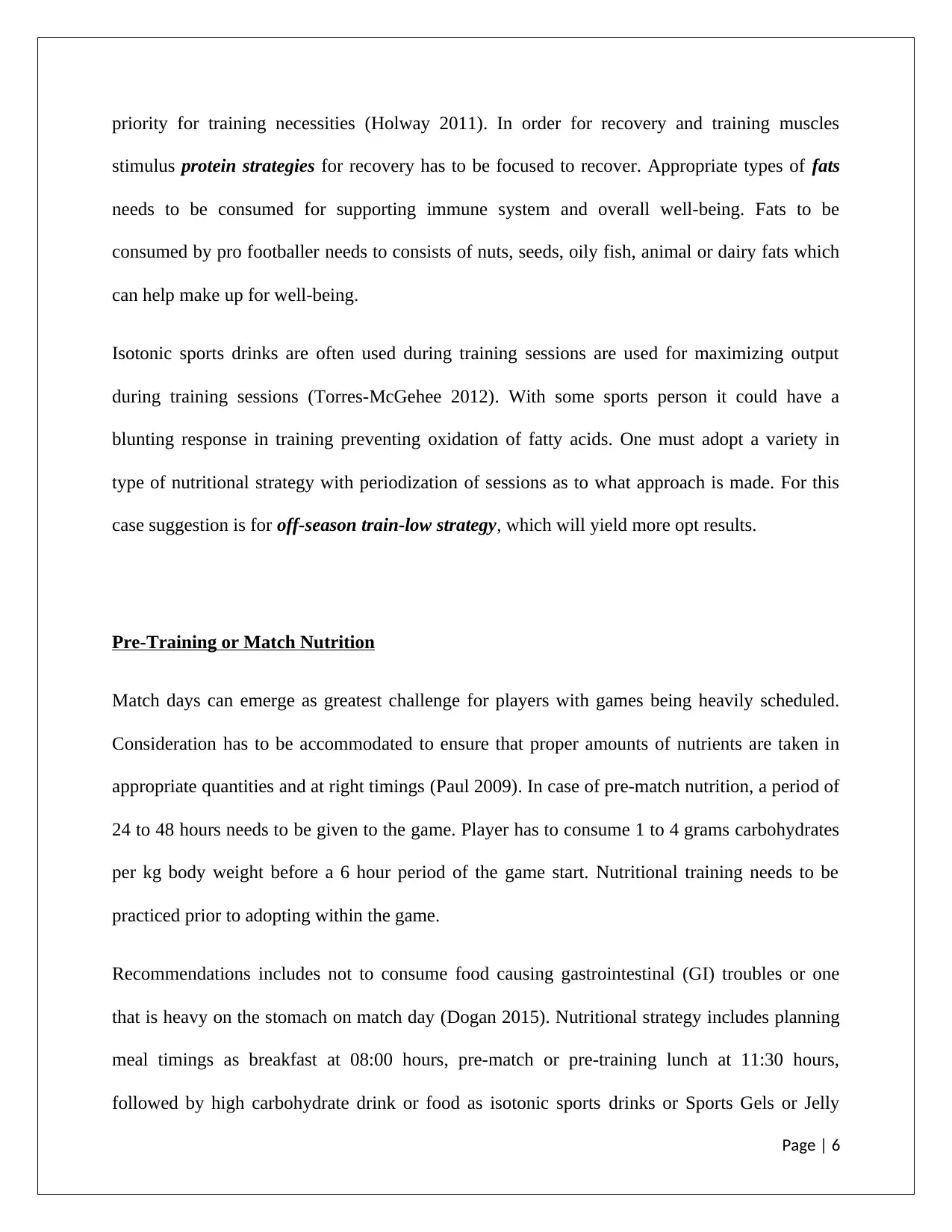
priority for training necessities (Holway 2011). In order for recovery and training muscles
stimulus protein strategies for recovery has to be focused to recover. Appropriate types of fats
needs to be consumed for supporting immune system and overall well-being. Fats to be
consumed by pro footballer needs to consists of nuts, seeds, oily fish, animal or dairy fats which
can help make up for well-being.
Isotonic sports drinks are often used during training sessions are used for maximizing output
during training sessions (Torres-McGehee 2012). With some sports person it could have a
blunting response in training preventing oxidation of fatty acids. One must adopt a variety in
type of nutritional strategy with periodization of sessions as to what approach is made. For this
case suggestion is for off-season train-low strategy, which will yield more opt results.
Pre-Training or Match Nutrition
Match days can emerge as greatest challenge for players with games being heavily scheduled.
Consideration has to be accommodated to ensure that proper amounts of nutrients are taken in
appropriate quantities and at right timings (Paul 2009). In case of pre-match nutrition, a period of
24 to 48 hours needs to be given to the game. Player has to consume 1 to 4 grams carbohydrates
per kg body weight before a 6 hour period of the game start. Nutritional training needs to be
practiced prior to adopting within the game.
Recommendations includes not to consume food causing gastrointestinal (GI) troubles or one
that is heavy on the stomach on match day (Dogan 2015). Nutritional strategy includes planning
meal timings as breakfast at 08:00 hours, pre-match or pre-training lunch at 11:30 hours,
followed by high carbohydrate drink or food as isotonic sports drinks or Sports Gels or Jelly
Page | 6
stimulus protein strategies for recovery has to be focused to recover. Appropriate types of fats
needs to be consumed for supporting immune system and overall well-being. Fats to be
consumed by pro footballer needs to consists of nuts, seeds, oily fish, animal or dairy fats which
can help make up for well-being.
Isotonic sports drinks are often used during training sessions are used for maximizing output
during training sessions (Torres-McGehee 2012). With some sports person it could have a
blunting response in training preventing oxidation of fatty acids. One must adopt a variety in
type of nutritional strategy with periodization of sessions as to what approach is made. For this
case suggestion is for off-season train-low strategy, which will yield more opt results.
Pre-Training or Match Nutrition
Match days can emerge as greatest challenge for players with games being heavily scheduled.
Consideration has to be accommodated to ensure that proper amounts of nutrients are taken in
appropriate quantities and at right timings (Paul 2009). In case of pre-match nutrition, a period of
24 to 48 hours needs to be given to the game. Player has to consume 1 to 4 grams carbohydrates
per kg body weight before a 6 hour period of the game start. Nutritional training needs to be
practiced prior to adopting within the game.
Recommendations includes not to consume food causing gastrointestinal (GI) troubles or one
that is heavy on the stomach on match day (Dogan 2015). Nutritional strategy includes planning
meal timings as breakfast at 08:00 hours, pre-match or pre-training lunch at 11:30 hours,
followed by high carbohydrate drink or food as isotonic sports drinks or Sports Gels or Jelly
Page | 6
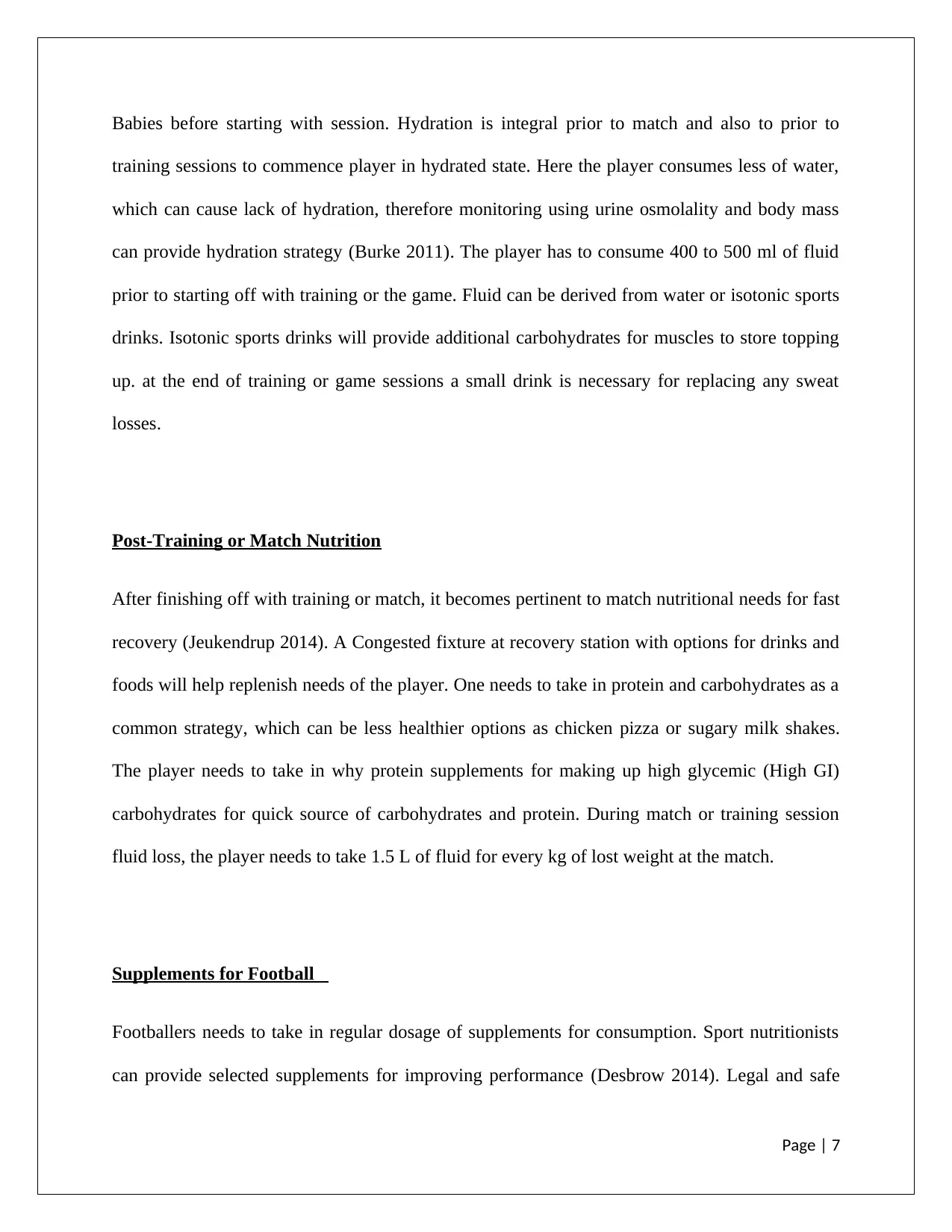
Babies before starting with session. Hydration is integral prior to match and also to prior to
training sessions to commence player in hydrated state. Here the player consumes less of water,
which can cause lack of hydration, therefore monitoring using urine osmolality and body mass
can provide hydration strategy (Burke 2011). The player has to consume 400 to 500 ml of fluid
prior to starting off with training or the game. Fluid can be derived from water or isotonic sports
drinks. Isotonic sports drinks will provide additional carbohydrates for muscles to store topping
up. at the end of training or game sessions a small drink is necessary for replacing any sweat
losses.
Post-Training or Match Nutrition
After finishing off with training or match, it becomes pertinent to match nutritional needs for fast
recovery (Jeukendrup 2014). A Congested fixture at recovery station with options for drinks and
foods will help replenish needs of the player. One needs to take in protein and carbohydrates as a
common strategy, which can be less healthier options as chicken pizza or sugary milk shakes.
The player needs to take in why protein supplements for making up high glycemic (High GI)
carbohydrates for quick source of carbohydrates and protein. During match or training session
fluid loss, the player needs to take 1.5 L of fluid for every kg of lost weight at the match.
Supplements for Football
Footballers needs to take in regular dosage of supplements for consumption. Sport nutritionists
can provide selected supplements for improving performance (Desbrow 2014). Legal and safe
Page | 7
training sessions to commence player in hydrated state. Here the player consumes less of water,
which can cause lack of hydration, therefore monitoring using urine osmolality and body mass
can provide hydration strategy (Burke 2011). The player has to consume 400 to 500 ml of fluid
prior to starting off with training or the game. Fluid can be derived from water or isotonic sports
drinks. Isotonic sports drinks will provide additional carbohydrates for muscles to store topping
up. at the end of training or game sessions a small drink is necessary for replacing any sweat
losses.
Post-Training or Match Nutrition
After finishing off with training or match, it becomes pertinent to match nutritional needs for fast
recovery (Jeukendrup 2014). A Congested fixture at recovery station with options for drinks and
foods will help replenish needs of the player. One needs to take in protein and carbohydrates as a
common strategy, which can be less healthier options as chicken pizza or sugary milk shakes.
The player needs to take in why protein supplements for making up high glycemic (High GI)
carbohydrates for quick source of carbohydrates and protein. During match or training session
fluid loss, the player needs to take 1.5 L of fluid for every kg of lost weight at the match.
Supplements for Football
Footballers needs to take in regular dosage of supplements for consumption. Sport nutritionists
can provide selected supplements for improving performance (Desbrow 2014). Legal and safe
Page | 7
Paraphrase This Document
Need a fresh take? Get an instant paraphrase of this document with our AI Paraphraser
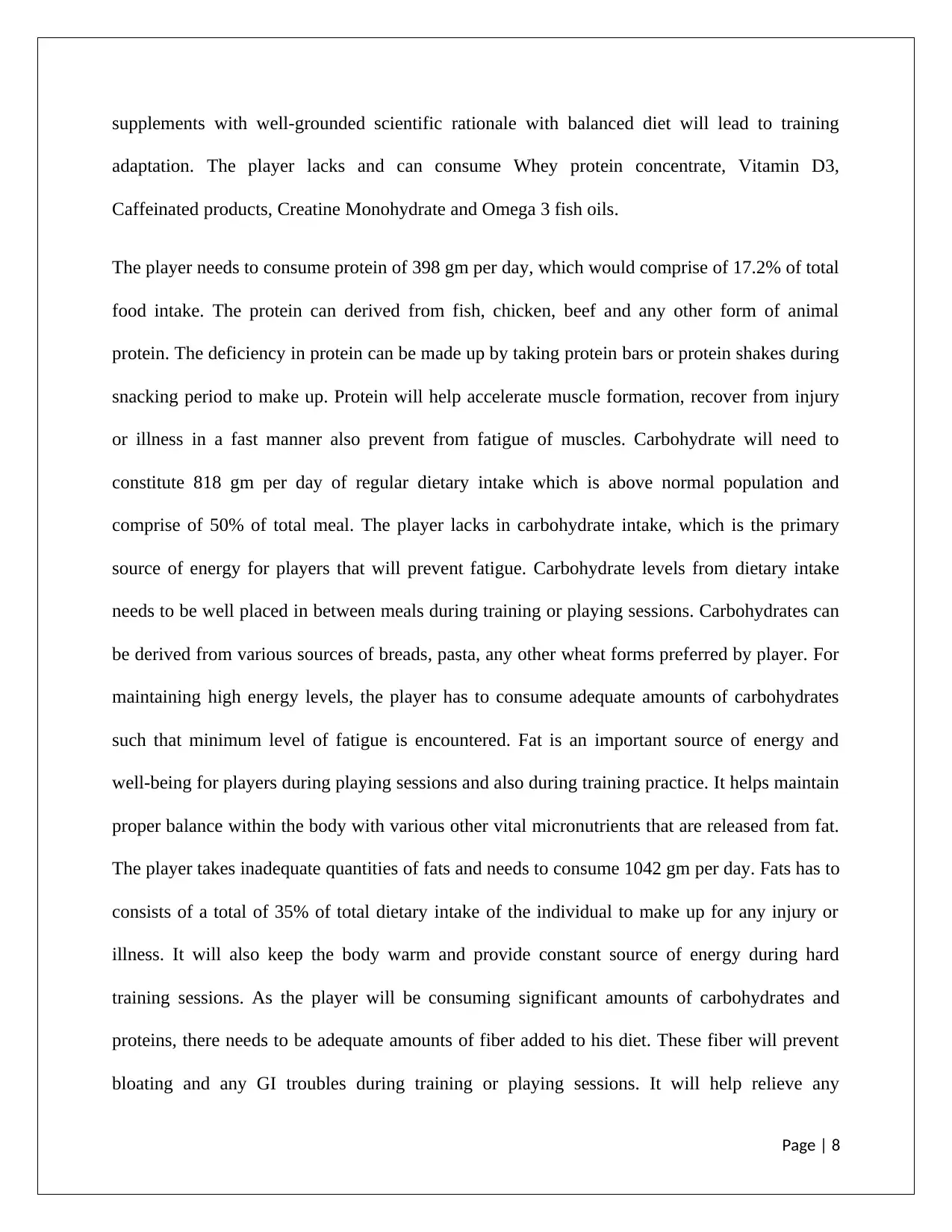
supplements with well-grounded scientific rationale with balanced diet will lead to training
adaptation. The player lacks and can consume Whey protein concentrate, Vitamin D3,
Caffeinated products, Creatine Monohydrate and Omega 3 fish oils.
The player needs to consume protein of 398 gm per day, which would comprise of 17.2% of total
food intake. The protein can derived from fish, chicken, beef and any other form of animal
protein. The deficiency in protein can be made up by taking protein bars or protein shakes during
snacking period to make up. Protein will help accelerate muscle formation, recover from injury
or illness in a fast manner also prevent from fatigue of muscles. Carbohydrate will need to
constitute 818 gm per day of regular dietary intake which is above normal population and
comprise of 50% of total meal. The player lacks in carbohydrate intake, which is the primary
source of energy for players that will prevent fatigue. Carbohydrate levels from dietary intake
needs to be well placed in between meals during training or playing sessions. Carbohydrates can
be derived from various sources of breads, pasta, any other wheat forms preferred by player. For
maintaining high energy levels, the player has to consume adequate amounts of carbohydrates
such that minimum level of fatigue is encountered. Fat is an important source of energy and
well-being for players during playing sessions and also during training practice. It helps maintain
proper balance within the body with various other vital micronutrients that are released from fat.
The player takes inadequate quantities of fats and needs to consume 1042 gm per day. Fats has to
consists of a total of 35% of total dietary intake of the individual to make up for any injury or
illness. It will also keep the body warm and provide constant source of energy during hard
training sessions. As the player will be consuming significant amounts of carbohydrates and
proteins, there needs to be adequate amounts of fiber added to his diet. These fiber will prevent
bloating and any GI troubles during training or playing sessions. It will help relieve any
Page | 8
adaptation. The player lacks and can consume Whey protein concentrate, Vitamin D3,
Caffeinated products, Creatine Monohydrate and Omega 3 fish oils.
The player needs to consume protein of 398 gm per day, which would comprise of 17.2% of total
food intake. The protein can derived from fish, chicken, beef and any other form of animal
protein. The deficiency in protein can be made up by taking protein bars or protein shakes during
snacking period to make up. Protein will help accelerate muscle formation, recover from injury
or illness in a fast manner also prevent from fatigue of muscles. Carbohydrate will need to
constitute 818 gm per day of regular dietary intake which is above normal population and
comprise of 50% of total meal. The player lacks in carbohydrate intake, which is the primary
source of energy for players that will prevent fatigue. Carbohydrate levels from dietary intake
needs to be well placed in between meals during training or playing sessions. Carbohydrates can
be derived from various sources of breads, pasta, any other wheat forms preferred by player. For
maintaining high energy levels, the player has to consume adequate amounts of carbohydrates
such that minimum level of fatigue is encountered. Fat is an important source of energy and
well-being for players during playing sessions and also during training practice. It helps maintain
proper balance within the body with various other vital micronutrients that are released from fat.
The player takes inadequate quantities of fats and needs to consume 1042 gm per day. Fats has to
consists of a total of 35% of total dietary intake of the individual to make up for any injury or
illness. It will also keep the body warm and provide constant source of energy during hard
training sessions. As the player will be consuming significant amounts of carbohydrates and
proteins, there needs to be adequate amounts of fiber added to his diet. These fiber will prevent
bloating and any GI troubles during training or playing sessions. It will help relieve any
Page | 8
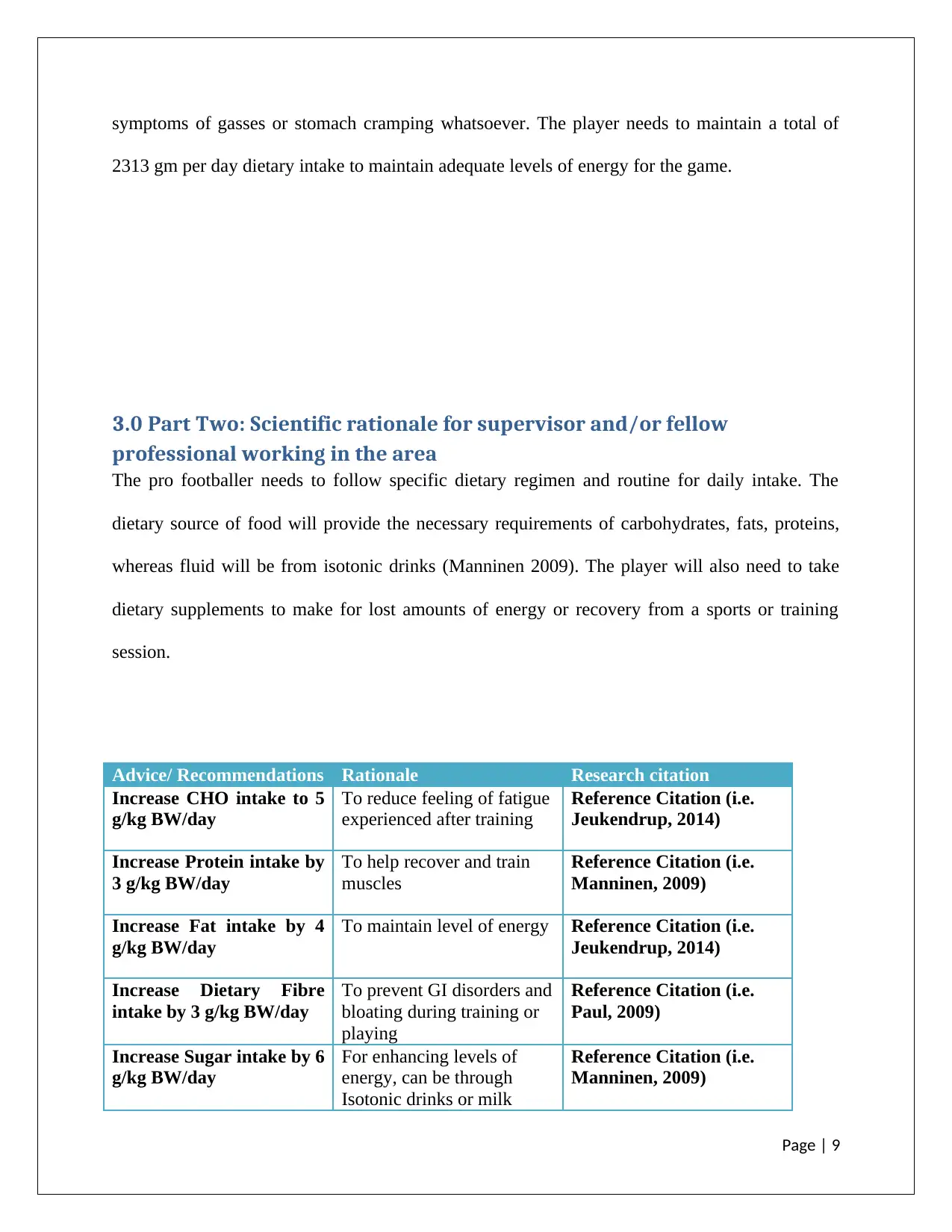
symptoms of gasses or stomach cramping whatsoever. The player needs to maintain a total of
2313 gm per day dietary intake to maintain adequate levels of energy for the game.
3.0 Part Two: Scientific rationale for supervisor and/or fellow
professional working in the area
The pro footballer needs to follow specific dietary regimen and routine for daily intake. The
dietary source of food will provide the necessary requirements of carbohydrates, fats, proteins,
whereas fluid will be from isotonic drinks (Manninen 2009). The player will also need to take
dietary supplements to make for lost amounts of energy or recovery from a sports or training
session.
Advice/ Recommendations Rationale Research citation
Increase CHO intake to 5
g/kg BW/day
To reduce feeling of fatigue
experienced after training
Reference Citation (i.e.
Jeukendrup, 2014)
Increase Protein intake by
3 g/kg BW/day
To help recover and train
muscles
Reference Citation (i.e.
Manninen, 2009)
Increase Fat intake by 4
g/kg BW/day
To maintain level of energy Reference Citation (i.e.
Jeukendrup, 2014)
Increase Dietary Fibre
intake by 3 g/kg BW/day
To prevent GI disorders and
bloating during training or
playing
Reference Citation (i.e.
Paul, 2009)
Increase Sugar intake by 6
g/kg BW/day
For enhancing levels of
energy, can be through
Isotonic drinks or milk
Reference Citation (i.e.
Manninen, 2009)
Page | 9
2313 gm per day dietary intake to maintain adequate levels of energy for the game.
3.0 Part Two: Scientific rationale for supervisor and/or fellow
professional working in the area
The pro footballer needs to follow specific dietary regimen and routine for daily intake. The
dietary source of food will provide the necessary requirements of carbohydrates, fats, proteins,
whereas fluid will be from isotonic drinks (Manninen 2009). The player will also need to take
dietary supplements to make for lost amounts of energy or recovery from a sports or training
session.
Advice/ Recommendations Rationale Research citation
Increase CHO intake to 5
g/kg BW/day
To reduce feeling of fatigue
experienced after training
Reference Citation (i.e.
Jeukendrup, 2014)
Increase Protein intake by
3 g/kg BW/day
To help recover and train
muscles
Reference Citation (i.e.
Manninen, 2009)
Increase Fat intake by 4
g/kg BW/day
To maintain level of energy Reference Citation (i.e.
Jeukendrup, 2014)
Increase Dietary Fibre
intake by 3 g/kg BW/day
To prevent GI disorders and
bloating during training or
playing
Reference Citation (i.e.
Paul, 2009)
Increase Sugar intake by 6
g/kg BW/day
For enhancing levels of
energy, can be through
Isotonic drinks or milk
Reference Citation (i.e.
Manninen, 2009)
Page | 9
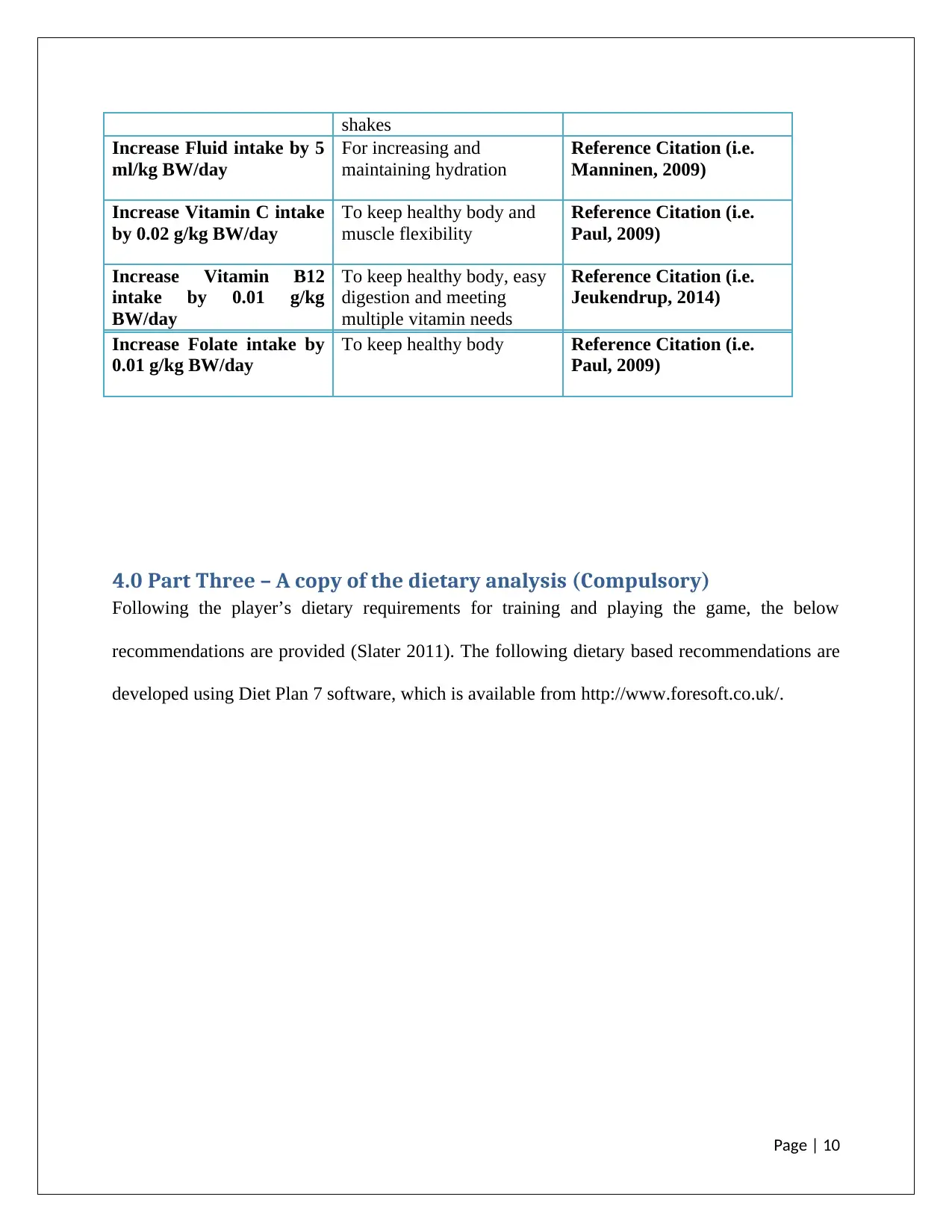
shakes
Increase Fluid intake by 5
ml/kg BW/day
For increasing and
maintaining hydration
Reference Citation (i.e.
Manninen, 2009)
Increase Vitamin C intake
by 0.02 g/kg BW/day
To keep healthy body and
muscle flexibility
Reference Citation (i.e.
Paul, 2009)
Increase Vitamin B12
intake by 0.01 g/kg
BW/day
To keep healthy body, easy
digestion and meeting
multiple vitamin needs
Reference Citation (i.e.
Jeukendrup, 2014)
Increase Folate intake by
0.01 g/kg BW/day
To keep healthy body Reference Citation (i.e.
Paul, 2009)
4.0 Part Three – A copy of the dietary analysis (Compulsory)
Following the player’s dietary requirements for training and playing the game, the below
recommendations are provided (Slater 2011). The following dietary based recommendations are
developed using Diet Plan 7 software, which is available from http://www.foresoft.co.uk/.
Page | 10
Increase Fluid intake by 5
ml/kg BW/day
For increasing and
maintaining hydration
Reference Citation (i.e.
Manninen, 2009)
Increase Vitamin C intake
by 0.02 g/kg BW/day
To keep healthy body and
muscle flexibility
Reference Citation (i.e.
Paul, 2009)
Increase Vitamin B12
intake by 0.01 g/kg
BW/day
To keep healthy body, easy
digestion and meeting
multiple vitamin needs
Reference Citation (i.e.
Jeukendrup, 2014)
Increase Folate intake by
0.01 g/kg BW/day
To keep healthy body Reference Citation (i.e.
Paul, 2009)
4.0 Part Three – A copy of the dietary analysis (Compulsory)
Following the player’s dietary requirements for training and playing the game, the below
recommendations are provided (Slater 2011). The following dietary based recommendations are
developed using Diet Plan 7 software, which is available from http://www.foresoft.co.uk/.
Page | 10
Secure Best Marks with AI Grader
Need help grading? Try our AI Grader for instant feedback on your assignments.
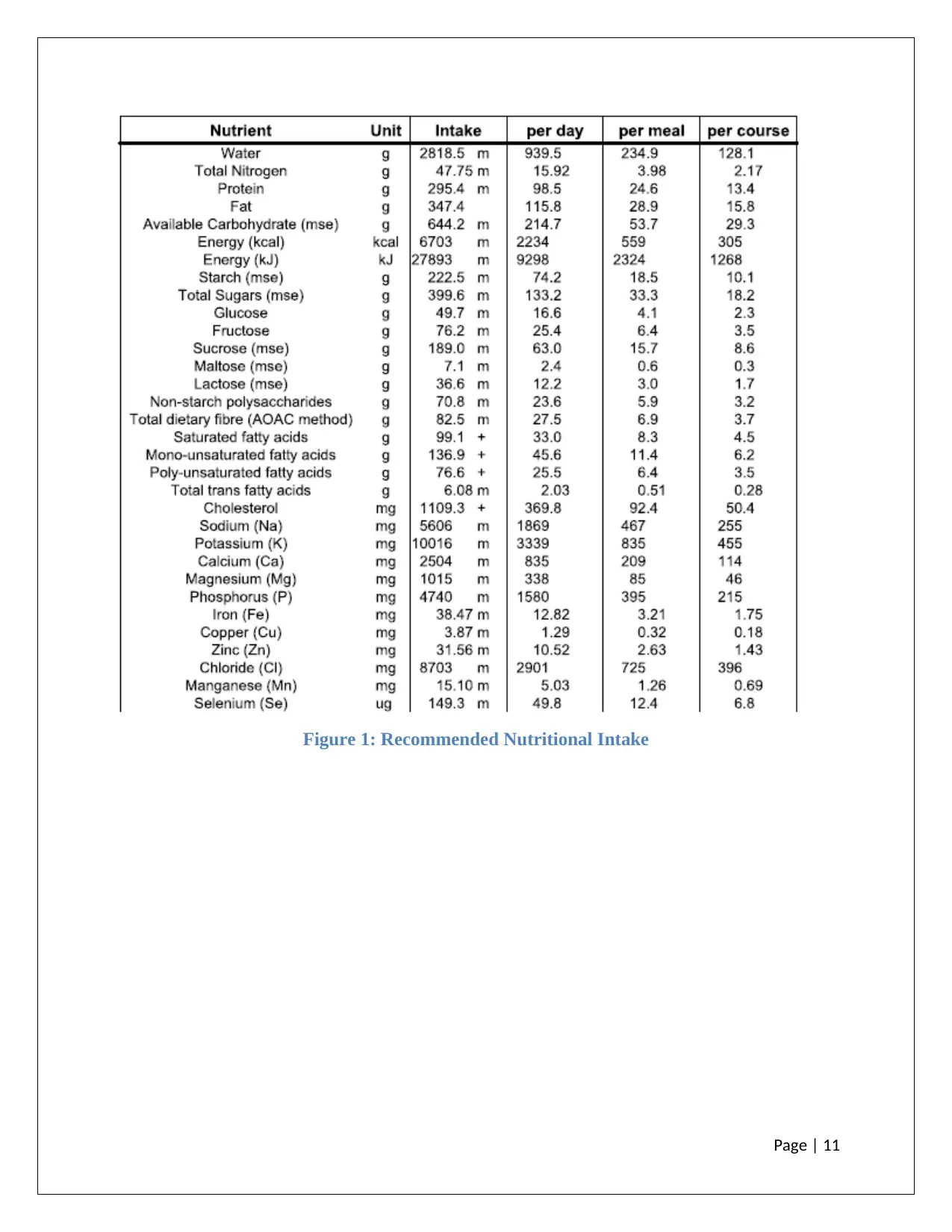
Figure 1: Recommended Nutritional Intake
Page | 11
Page | 11
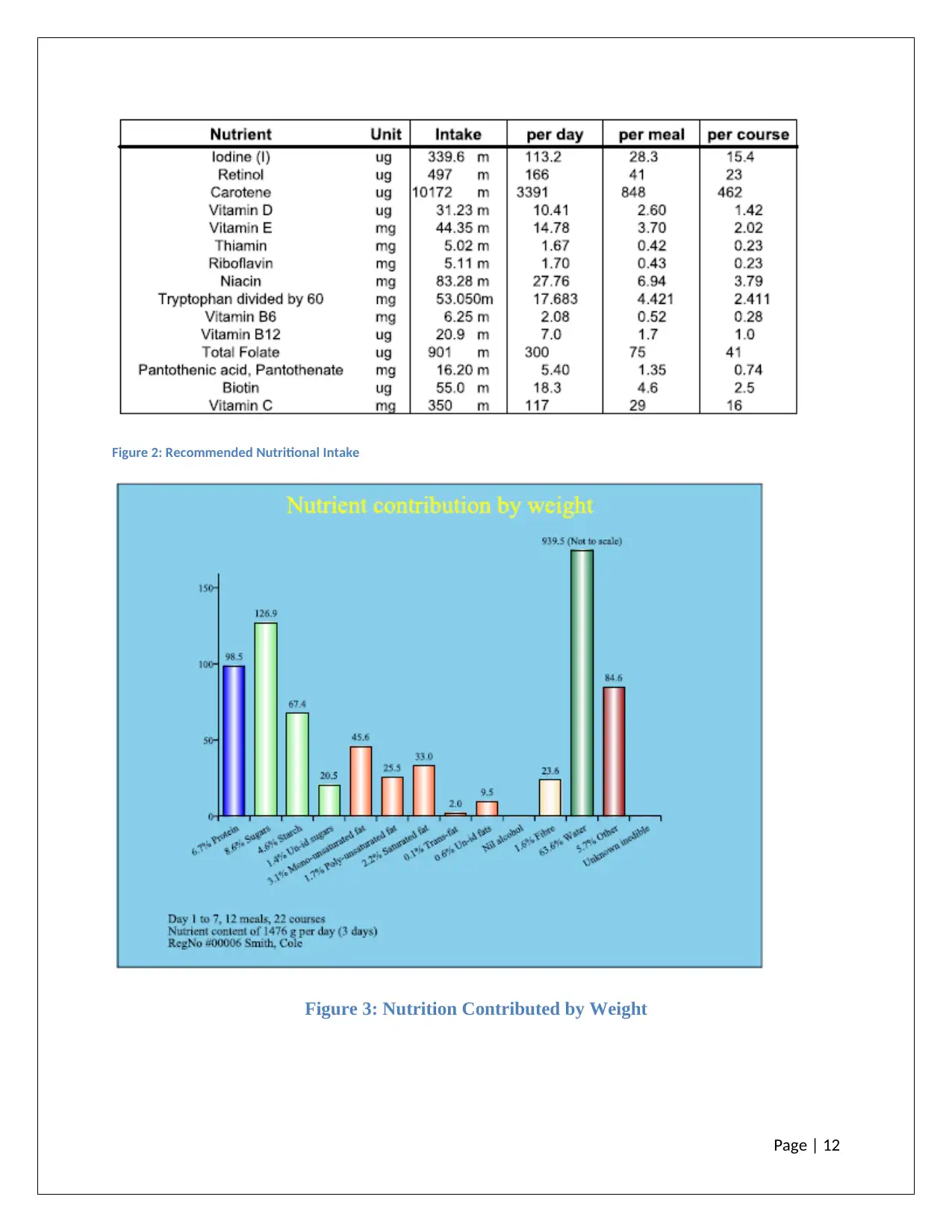
Figure 2: Recommended Nutritional Intake
Figure 3: Nutrition Contributed by Weight
Page | 12
Figure 3: Nutrition Contributed by Weight
Page | 12
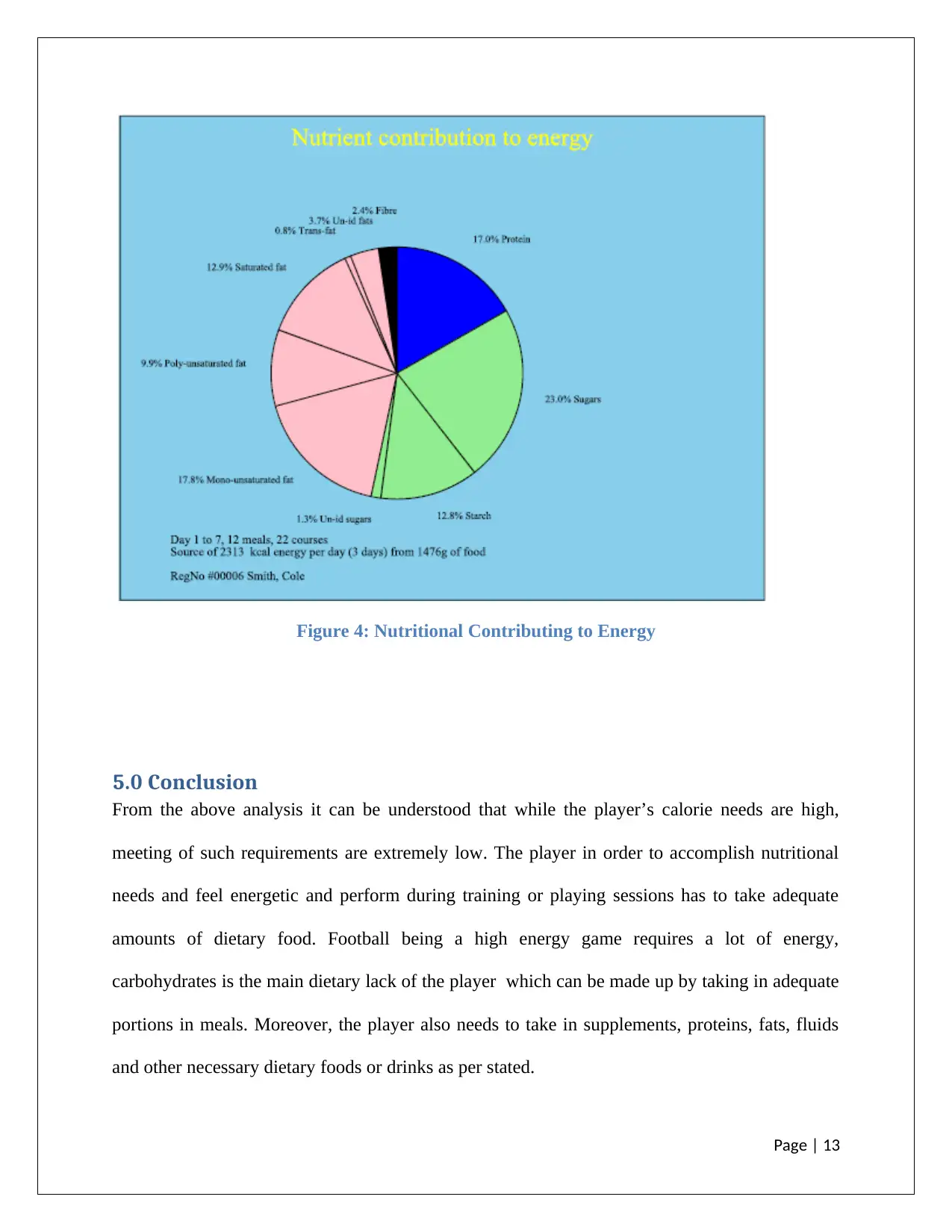
Figure 4: Nutritional Contributing to Energy
5.0 Conclusion
From the above analysis it can be understood that while the player’s calorie needs are high,
meeting of such requirements are extremely low. The player in order to accomplish nutritional
needs and feel energetic and perform during training or playing sessions has to take adequate
amounts of dietary food. Football being a high energy game requires a lot of energy,
carbohydrates is the main dietary lack of the player which can be made up by taking in adequate
portions in meals. Moreover, the player also needs to take in supplements, proteins, fats, fluids
and other necessary dietary foods or drinks as per stated.
Page | 13
5.0 Conclusion
From the above analysis it can be understood that while the player’s calorie needs are high,
meeting of such requirements are extremely low. The player in order to accomplish nutritional
needs and feel energetic and perform during training or playing sessions has to take adequate
amounts of dietary food. Football being a high energy game requires a lot of energy,
carbohydrates is the main dietary lack of the player which can be made up by taking in adequate
portions in meals. Moreover, the player also needs to take in supplements, proteins, fats, fluids
and other necessary dietary foods or drinks as per stated.
Page | 13
Paraphrase This Document
Need a fresh take? Get an instant paraphrase of this document with our AI Paraphraser
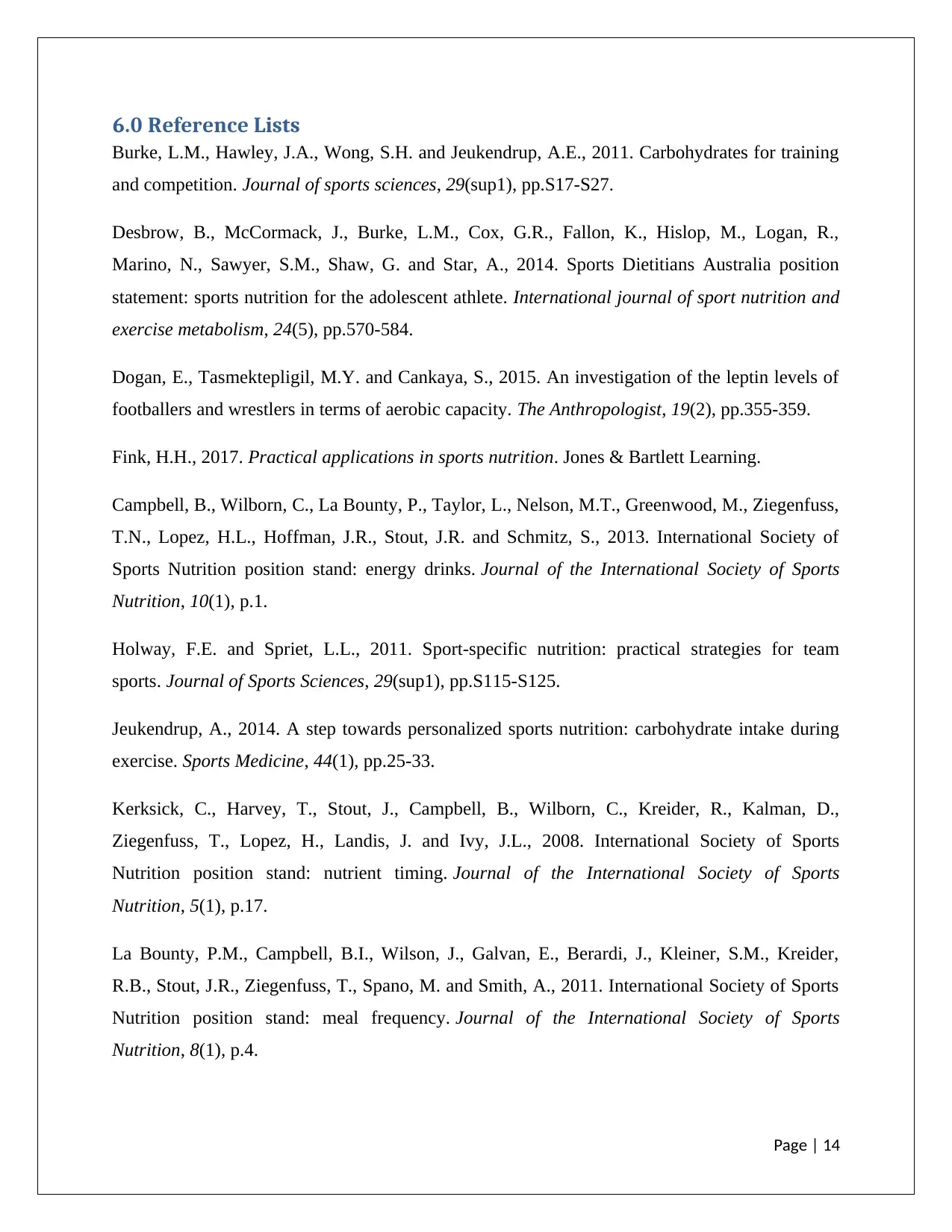
6.0 Reference Lists
Burke, L.M., Hawley, J.A., Wong, S.H. and Jeukendrup, A.E., 2011. Carbohydrates for training
and competition. Journal of sports sciences, 29(sup1), pp.S17-S27.
Desbrow, B., McCormack, J., Burke, L.M., Cox, G.R., Fallon, K., Hislop, M., Logan, R.,
Marino, N., Sawyer, S.M., Shaw, G. and Star, A., 2014. Sports Dietitians Australia position
statement: sports nutrition for the adolescent athlete. International journal of sport nutrition and
exercise metabolism, 24(5), pp.570-584.
Dogan, E., Tasmektepligil, M.Y. and Cankaya, S., 2015. An investigation of the leptin levels of
footballers and wrestlers in terms of aerobic capacity. The Anthropologist, 19(2), pp.355-359.
Fink, H.H., 2017. Practical applications in sports nutrition. Jones & Bartlett Learning.
Campbell, B., Wilborn, C., La Bounty, P., Taylor, L., Nelson, M.T., Greenwood, M., Ziegenfuss,
T.N., Lopez, H.L., Hoffman, J.R., Stout, J.R. and Schmitz, S., 2013. International Society of
Sports Nutrition position stand: energy drinks. Journal of the International Society of Sports
Nutrition, 10(1), p.1.
Holway, F.E. and Spriet, L.L., 2011. Sport-specific nutrition: practical strategies for team
sports. Journal of Sports Sciences, 29(sup1), pp.S115-S125.
Jeukendrup, A., 2014. A step towards personalized sports nutrition: carbohydrate intake during
exercise. Sports Medicine, 44(1), pp.25-33.
Kerksick, C., Harvey, T., Stout, J., Campbell, B., Wilborn, C., Kreider, R., Kalman, D.,
Ziegenfuss, T., Lopez, H., Landis, J. and Ivy, J.L., 2008. International Society of Sports
Nutrition position stand: nutrient timing. Journal of the International Society of Sports
Nutrition, 5(1), p.17.
La Bounty, P.M., Campbell, B.I., Wilson, J., Galvan, E., Berardi, J., Kleiner, S.M., Kreider,
R.B., Stout, J.R., Ziegenfuss, T., Spano, M. and Smith, A., 2011. International Society of Sports
Nutrition position stand: meal frequency. Journal of the International Society of Sports
Nutrition, 8(1), p.4.
Page | 14
Burke, L.M., Hawley, J.A., Wong, S.H. and Jeukendrup, A.E., 2011. Carbohydrates for training
and competition. Journal of sports sciences, 29(sup1), pp.S17-S27.
Desbrow, B., McCormack, J., Burke, L.M., Cox, G.R., Fallon, K., Hislop, M., Logan, R.,
Marino, N., Sawyer, S.M., Shaw, G. and Star, A., 2014. Sports Dietitians Australia position
statement: sports nutrition for the adolescent athlete. International journal of sport nutrition and
exercise metabolism, 24(5), pp.570-584.
Dogan, E., Tasmektepligil, M.Y. and Cankaya, S., 2015. An investigation of the leptin levels of
footballers and wrestlers in terms of aerobic capacity. The Anthropologist, 19(2), pp.355-359.
Fink, H.H., 2017. Practical applications in sports nutrition. Jones & Bartlett Learning.
Campbell, B., Wilborn, C., La Bounty, P., Taylor, L., Nelson, M.T., Greenwood, M., Ziegenfuss,
T.N., Lopez, H.L., Hoffman, J.R., Stout, J.R. and Schmitz, S., 2013. International Society of
Sports Nutrition position stand: energy drinks. Journal of the International Society of Sports
Nutrition, 10(1), p.1.
Holway, F.E. and Spriet, L.L., 2011. Sport-specific nutrition: practical strategies for team
sports. Journal of Sports Sciences, 29(sup1), pp.S115-S125.
Jeukendrup, A., 2014. A step towards personalized sports nutrition: carbohydrate intake during
exercise. Sports Medicine, 44(1), pp.25-33.
Kerksick, C., Harvey, T., Stout, J., Campbell, B., Wilborn, C., Kreider, R., Kalman, D.,
Ziegenfuss, T., Lopez, H., Landis, J. and Ivy, J.L., 2008. International Society of Sports
Nutrition position stand: nutrient timing. Journal of the International Society of Sports
Nutrition, 5(1), p.17.
La Bounty, P.M., Campbell, B.I., Wilson, J., Galvan, E., Berardi, J., Kleiner, S.M., Kreider,
R.B., Stout, J.R., Ziegenfuss, T., Spano, M. and Smith, A., 2011. International Society of Sports
Nutrition position stand: meal frequency. Journal of the International Society of Sports
Nutrition, 8(1), p.4.
Page | 14
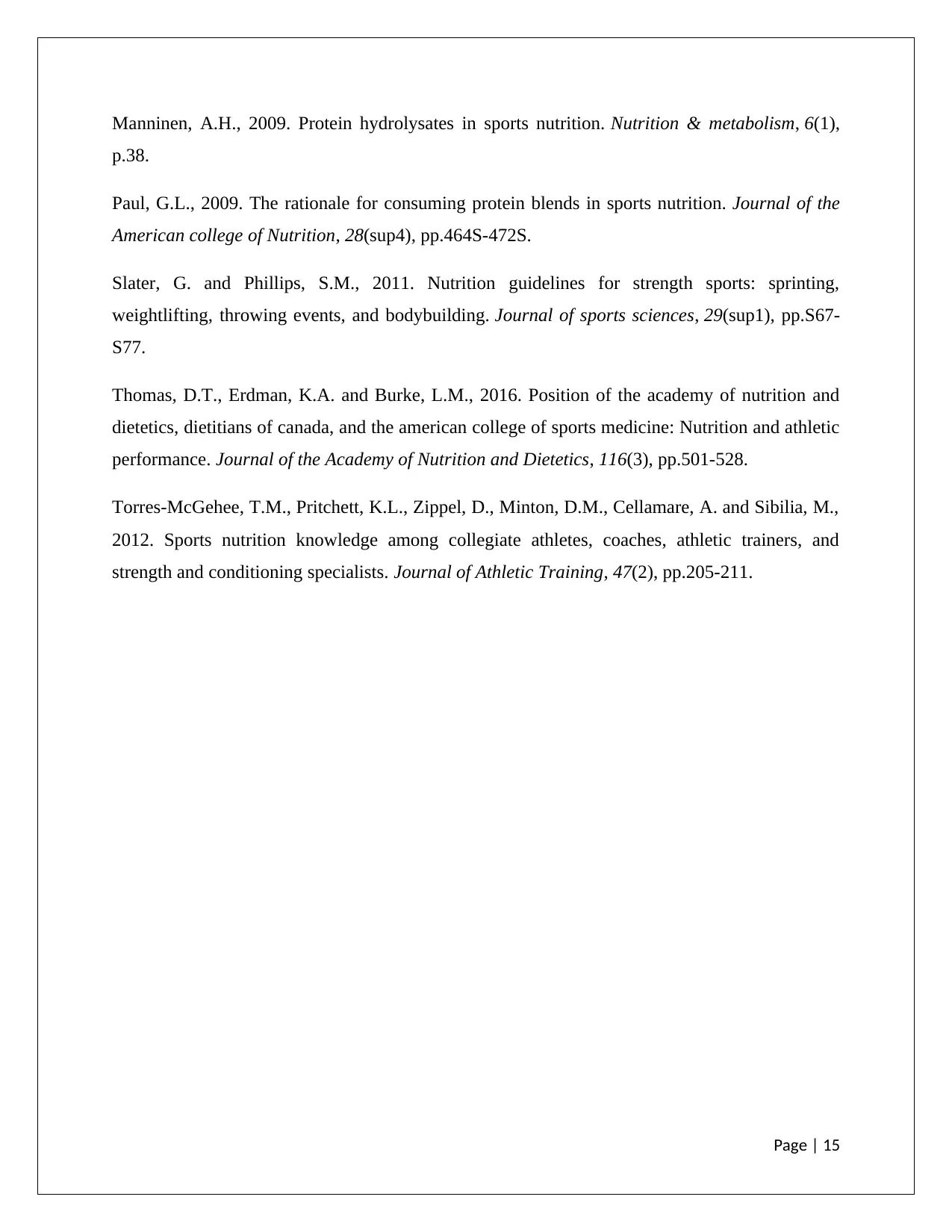
Manninen, A.H., 2009. Protein hydrolysates in sports nutrition. Nutrition & metabolism, 6(1),
p.38.
Paul, G.L., 2009. The rationale for consuming protein blends in sports nutrition. Journal of the
American college of Nutrition, 28(sup4), pp.464S-472S.
Slater, G. and Phillips, S.M., 2011. Nutrition guidelines for strength sports: sprinting,
weightlifting, throwing events, and bodybuilding. Journal of sports sciences, 29(sup1), pp.S67-
S77.
Thomas, D.T., Erdman, K.A. and Burke, L.M., 2016. Position of the academy of nutrition and
dietetics, dietitians of canada, and the american college of sports medicine: Nutrition and athletic
performance. Journal of the Academy of Nutrition and Dietetics, 116(3), pp.501-528.
Torres-McGehee, T.M., Pritchett, K.L., Zippel, D., Minton, D.M., Cellamare, A. and Sibilia, M.,
2012. Sports nutrition knowledge among collegiate athletes, coaches, athletic trainers, and
strength and conditioning specialists. Journal of Athletic Training, 47(2), pp.205-211.
Page | 15
p.38.
Paul, G.L., 2009. The rationale for consuming protein blends in sports nutrition. Journal of the
American college of Nutrition, 28(sup4), pp.464S-472S.
Slater, G. and Phillips, S.M., 2011. Nutrition guidelines for strength sports: sprinting,
weightlifting, throwing events, and bodybuilding. Journal of sports sciences, 29(sup1), pp.S67-
S77.
Thomas, D.T., Erdman, K.A. and Burke, L.M., 2016. Position of the academy of nutrition and
dietetics, dietitians of canada, and the american college of sports medicine: Nutrition and athletic
performance. Journal of the Academy of Nutrition and Dietetics, 116(3), pp.501-528.
Torres-McGehee, T.M., Pritchett, K.L., Zippel, D., Minton, D.M., Cellamare, A. and Sibilia, M.,
2012. Sports nutrition knowledge among collegiate athletes, coaches, athletic trainers, and
strength and conditioning specialists. Journal of Athletic Training, 47(2), pp.205-211.
Page | 15
1 out of 15
Related Documents
Your All-in-One AI-Powered Toolkit for Academic Success.
+13062052269
info@desklib.com
Available 24*7 on WhatsApp / Email
![[object Object]](/_next/static/media/star-bottom.7253800d.svg)
Unlock your academic potential
© 2024 | Zucol Services PVT LTD | All rights reserved.




